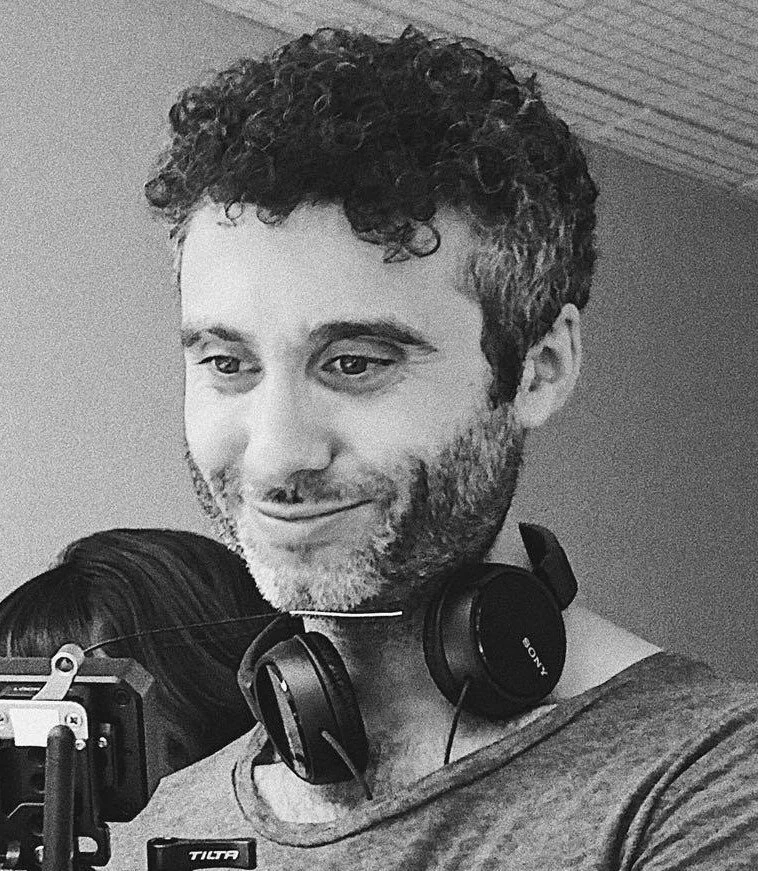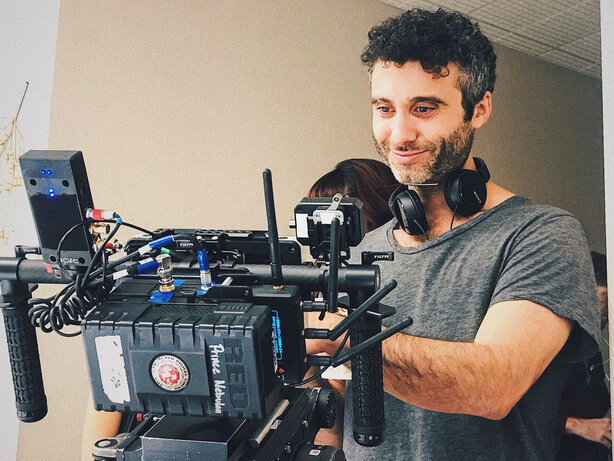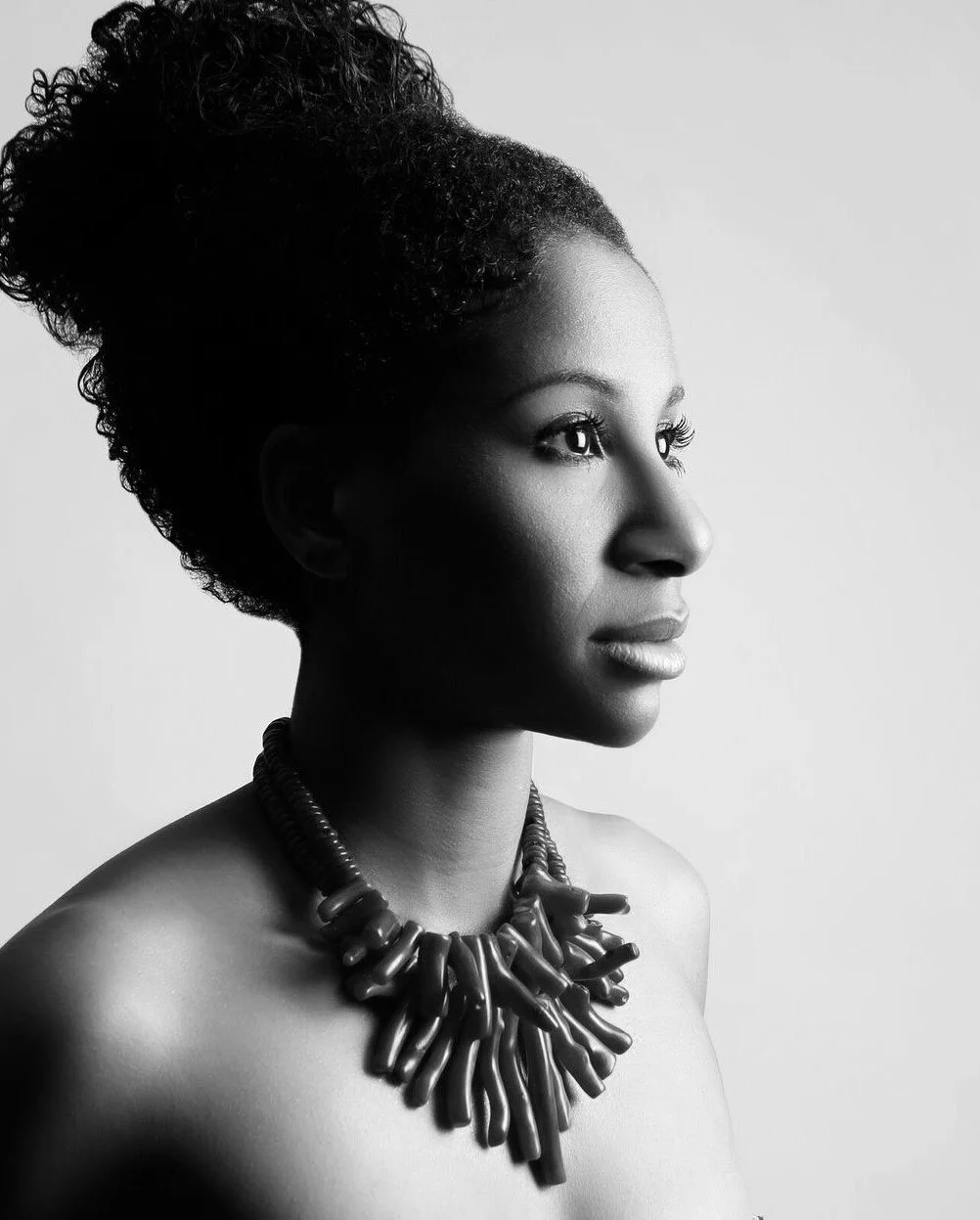GILLE KLABIN
Justin Long and Sheila Vand in The Wave
Gille Klabin had extensive experience directing music videos before his feature film directorial debut The Wave was released in early 2020. In this interview, he discusses the long development process for The Wave, psychedelics entering mainstream cinema, collaborating with screenwriter Carl W. Lucas, and the joys of being cooped up for three months with his friend and visual effects supervisor Patrick Lawler.
Interview by Tyler Nesler
What is a big personally formative film for you, one that you think may have influenced you to make a more experimental first feature such as The Wave?
So many films have been wildly formative to me, so I’ll just answer the first one that comes to mind: Fight Club. I remember feeling the same rush of entertainment I felt with more mainstream movies but just being completely intoxicated by the new and different feel of the film. Not only in its dark tonality but in the intricate and layered socioeconomic commentary that the film focused on. I remember feeling that rush of inspiration to tell unorthodox stories that spoke to something prevalent in our society. The film was a modern and strangely earnest look at how broken we have all become chasing the dreams that have been taught to us. As a fourteen-year-old at the time I was profoundly affected. I know it’s cliche to love Fight Club but there’s a reason so many people love it, it was original and excellently made in every regard.
The Wave is in a similar vein as other recent films I like to think of "psychedelic thrillers" such as Panos Cosmatos's Beyond the Black Rainbow and Mandy, and Gaspar Noe's Enter the Void and Climax. Do you think the psychedelic-themed thriller has become a type of genre in its own right? Any psychedelic films in particular that served as inspirations for The Wave?
I do feel we’re definitely seeing the age of psychedelics entering mainstream cinema in a more meaningful fashion. The societal conversation about what these substances do and what those experiences mean are coming to the forefront. There’s something fundamentally human and beautiful about those altered states and I feel as the drugs become less taboo we are talking more about the implications. I’m incredibly flattered to be thought of in the same light as the films you mentioned, and I think it’s pretty clear to see how aggressively the visual and tonal aesthetic of Gaspar Noe’s Enter the Void affected me.
Gille Klabin on the set of The Wave
Prior to The Wave, you directed music videos, commercials, and documentaries. What are some aspects to the economy and speed of these projects that you think helped with the production process of your first feature? Were you always confident that you could pull off an arresting visual film with limited time and money?
My background was almost exclusively low budget music videos, most of which I would steer towards narrative little shorts. Working on those projects taught me, through necessity, to work within the limitations of a project and to be imaginative in the ways I told stories because you have to do what you can to stand out. You learn how to do little tricks to make a cool moment for viewers to get sucked into. The Wave was a culmination of years of that discipline, all the transitions and wild camera moves were all delicately planned out with the same teams I shoot videos with. Myself and my VFX supervisor Patrick Lawler did all the visual effects for The Wave, working out of a spare room in his house. It was the decades of low budget music videos that gave us the knowledge and skills to pull the movie off. Also, we’re so used to working months on end with little to no money making something ambitious, this time at least there wasn’t a client to please, it was just us trying to be the best we could possibly be.
The main character in The Wave, Frank (Justin Long), is ostensibly a morally compromised person in his corporate lawyer position. However, he seems sadly deluded by what he believes he should have in his life. In many ways he seems compromised by the pressures of capitalism. What were some challenges in rendering a character who initially seems like a selfish asshole into someone the audience can care about? What added dimensions do you think Justin Long brought to the role?
So the character in the movie who has his insurance policy declined (Lt. Warren) is actually based on the writer/producer Carl’s real life cousin. He was a firefighter who died on the job and some insurance lawyer dug through a decade of medical history to claim the death as suicide (it was a heart attack) and withheld the policy payout to the family. So The Wave was partially a vengeful fantasy of the universe fixing a moral wrong, but it was also an attempt to humanize and understand the person simply doing their job well (Frank).
So on paper this guy does a lot of bad things but he’s also just a person, lost in this world, trying to find meaning and value within the game that’s been presented to him. I was very scared early on that we were gonna cast someone who wasn’t fundamentally lovable. Never dreamed we could attract someone as big as Justin to the project, but when he responded well to the script I felt my wildest dreams were being fulfilled. Justin is such an accessible, earnest, and fundamentally likable guy, I can’t fathom someone else playing Frank. Justin brought a beating heart to an otherwise unlikable man.
Ultimately Frank is taught a kind of ethics lesson by the universe via the powerful drug he takes. The film covers topics of exploitation, corruption, and materialism without getting heavy-handed. What elements of the film do you think worked well to help impart a message or social commentary without it ultimately becoming too didactic?
We really focused on keeping things messy, Frank (and the audience) don’t get to learn and comprehend the innermost workings of the universe, we learn just enough to see the beauty and balance of the film’s events. I tried in every way to put us in Frank’s shoes, to give us the same rush, anxiety, and delirium that Frank endures throughout the film. I think this sense of taking a ride is what keeps the film entertaining and not too bogged down in our soapbox philosophical lectures. The universe is a messy place with a lot of gray zone. We wanted to wade in those waters but also just entertain the shit out of you for eighty-seven minutes of your life.
The mysterious figure who Frank meets at the house party, Aeolus (Tommy Flanagan), is a very calm and controlled sage-like presence. The plot pivots around Frank's meeting this trickster-like character who introduces the mysterious transformative drug to him. This character could have been played in less measured or campier ways, however Flanagan brings an interesting balance of menace and shamanism to the role. What were some challenges of casting this crucial character? How did Flanagan wind up in the role?
Casting a movie this small happens in a crazy exponential curve, once Justin was in we suddenly had a small window of time to cast the remaining roles. That’s all done by casting directors giving you a list of good options for each role who are available in the rapidly approaching window of time you’re shooting in. When they suggested Tommy I audibly laughed because it seemed so ridiculously unobtainable, but his agent assured us he’d consider it seriously. So we made him an offer and he signed on about two weeks before we shot. It’s nuts how many pieces fall into place moments before you film. Tommy just slid into the role with such ease and style. It was a joy to watch.
Tommy Flanagan as Aeolus
Theresa, the wry young woman Frank meets at the club (Sheila Vand), openly questions his job as a soulless corporate lawyer, and later during his hallucinatory experiences she reappears to him as a sort of ethereal teacher or guide. However, it's revealed that she is not actually the more worldly person he initially thinks he meets. Would it be safe to speculate that in some ways she is a manifestation of his own conflicted subconscious? She questions his path before he even takes the drug. What do you think she ultimately means to Frank?
The idea was that Aeolus is chaos and Theresa is Destiny, together they are the wild duality of the universe. Aeolus is a swarthy care free man that oozes sexuality (everything Frank isn’t and wishes he was) and Theresa is a free spirited, confident and candid woman (everything Frank wishes he could be with). They’re both effigies of the universe designed to help Frank learn his lessons in a familiar fashion rather than a cosmic kick in the balls.
Sheila Vand and Justin Long
Screenwriter Carl W. Lucas collaborated closely with you during the writing process. How do you feel that his appreciation of your visual style served the writing in ways which uniquely benefited the project? Any plans for future collaborations with him?
Carl wrote the film with me in mind from the start. Transitions were based on effects he knew I could do because he had seen my videos. We were gonna make this film for pennies and beg for favors and charity. When it all blew up we just scaled up, but the script was designed to be small and manageable; eleven locations, forty-eight scenes in total. Carl believed in me more than any sane person should have. He gave me such access and freedom to contribute and it was a really wonderful collaboration. I can’t fathom having made my first movie with anyone else. Carl and I speak often about our next project, it will come but we’re not sure exactly which one will be first.
The film has some beautifully rendered sequences, such as the surreal cosmic sky white sands desert scenes with Frank and Theresa. What was the experience like creating those scenes with visual effects supervisor Patrick Lawler? Theresa's unique flowing dress is also an interesting component of that scene, any insight into costume designer Jennifer Newman's inspirations for it?
I’m immensely proud of both Patrick and Jennifer. They, alongside everyone else, showed up every day and gave every drop of innovation and energy they had. Patrick is one of my best friends so being cooped up with him for three and a half months in a room was a joy. We were just pushing ourselves to impress one another and out do everything we’d ever done before. As for Jennifer, we needed something flowing and magic and Jennifer just popped up and said “I can make something.” She sketched something out and it was clear as day that she had the confidence and conviction to pull it off. I was so psyched to be with a crew who were all swinging for the fences, every day, we were all just trying to impress each other and have fun.
Psychedelic experiences can be so subjective and personal that it's not easy to render them with verisimilitude. What key elements of psychedelic journeys did you try to portray in this film that can be related to by people who have experienced these substances directly?
I have been profoundly affected by my own psychedelic experiences. They challenged my perspectives on everything, they brought my own delusions to the forefront, but they also showed me the beauty of life and the world. I wanted to replicate the awe, terror and beauty of psychedelics in a way that was fantastical but also real. Patrick and I created processes over the course of several years to really replicate visuals from these altered states. I hate how these types of experiences are usually depicted in movies so I wanted to keep something more balanced while still being an entertaining journey.
What were some learning experiences for you on this first feature? What will you do differently the next go around?
I really learned the power of planning and preparation. It took us so long to get this film off the ground that I had years to prepare. I made an animatic of the whole film, tested out shots and transitions, the works. It really paid off and allowed the crew to all be on the same page, which really allows you to pull off some ambitious stuff. So moving forward I will never be less prepared than I was on The Wave. Though I guess that’s a positive that simply worked. If I have to find a fault that didn’t work, I’d say sometimes in the movie I gave too much focus to some dynamic long shot rather than giving the scene the specific pace or composition it needed. Of course hindsight is 20/20 with these things but I feel I would cover scenes even better next time.
What's coming up for you in the near future? Any new projects in the works that you would like people to know about?
I don’t think I have anything I can directly plug here because I’m not sure what’s gonna happen, but I would love one day to direct one of my own scripts. I find writing incredibly intimidating but have managed to get drafts out of my own scripts that I’m proud of. So I’m currently getting that off the ground. But also I’m back to making short form stuff because frankly I need a little break from years long projects. I gave this film everything I had, even going so far as to edit the trailers and social media posts. I’d like to make some crazy music videos and I’m starting to, even while quarantined in my house.
The Wave is available to stream on multiple platforms now
Tyler Nesler is a New York City-based freelance writer and the Founder and Managing Editor of INTERLOCUTOR Magazine.










